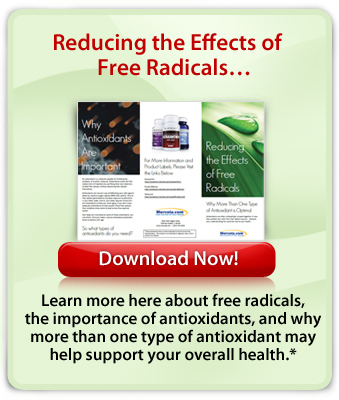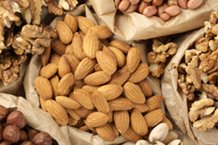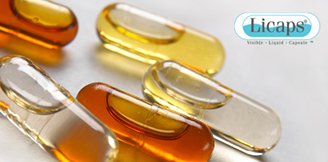These supplements only focus on about 12% of the healthy compounds available in its natural form – and if high levels of the one they contain flood your system, they can potentially deplete the other 7,
wreaking havoc on your body. Buyer beware…
It is very clear to me that the best possible nourishment you can get comes from the foods you eat.
If you eat a balanced unprocessed diet, full of high-quality raw and fresh organic foods, you'll provide your body with the vital nutrients it needs for reaching or maintaining optimal health.
The challenge is not only following this sound dietary practice, but also getting the diversity of nutrients you need from a wide variety of wholesome foods. Generally speaking, this is where I believe certain types of supplements can complement your diet and provide some insurance when you might unknowingly come up short.
But with all this said, I do raise a caution flag with supplements. Why?
First of all, I certainly do not support using supplements as a way to justify poor food choices. Secondly, I believe that in order to optimize any supplement, you must invest the time to carefully analyze each formula's ingredients.
One of my main concerns is, to save time, you might simply go out and buy the least expensive one you can find. There's nothing wrong with trying to save money, but the risk with 'cheap' supplements is that you are frequently better off not taking any supplement at all. Cheap supplements may compromise your health.
A major issue with many cheap supplements is they tend to be made from inferior synthetic ingredients. But I'll be the first to admit that identifying synthetic ingredients is not always easy. I can tell you from personal experience that frequently the label on a supplement bottle doesn't always disclose everything you should know about the ingredients.
To help you better understand this, let's focus in on one particular supplement that is now part of my daily supplement regimen. I'll share with you the steps I've taken to make sure I avoid any synthetics and other potentially risky ingredients… and why I recommend you do the same.
Avoid Synthetic Forms of This Vital Nutrient
If you take synthetic forms of some types of vitamins, not only will your body risk being deprived of the nutrient benefits, you could actually cause more harm than good.
Let's take synthetic vitamin E as an example. So what are the issues with synthetic vitamin E and how could it create such a negative impact?
Here are a few key points on vitamin E you should be aware of…

- Natural vitamin E is a family of eight different compounds: four tocopherols and four tocotrienols…
- If you eat certain wholesome foods, all eight of the different vitamin E compounds are naturally available…
- When it comes to a synthetic vitamin E supplement, only one of the eight compounds is available (alpha-tocopherol). The other seven compounds are not typically available in a chemically-derived form…
- Synthetic vitamin E supplements only focus on about 12% of the healthy compounds available in naturally-occurring vitamin E found in certain foods…
- Many clinical studies evaluating vitamin E have only observed results using synthetic vitamin E and the single compound alpha-tocopherol, and often ignored the other seven health-boosting compounds…
At this point, you should understand why I don’t recommend taking synthetic forms of vitamins… especially vitamin E. But first, as I already mentioned above, finding a non-synthetic form of vitamin E is not always an easy ‘slam-dunk.’ And here’s something to watch out for…
Health Risks Associated with Soy You Need to Know About
Even so-called 'natural' forms of supplements may not be all they're cracked up to be if they contain ingredients like soy--which is typically used in most vitamin E supplements.
Soybean oil is simply not a healthy oil. The majority of soy grown in the US is genetically engineered (GE). As a result, it contains the potent herbicide glyphosate.
Whether it is organically grown or not, soy also contains a number of problematic compounds that can potentially wreak havoc with your health, such as…
- Goitrogens – These are found in unfermented soy, whether it's organic or not. These substances can block the synthesis of thyroid hormones and interfere with iodine metabolism.
- Isoflavones: genistein and daidzein – Isoflavones are a type of phytoestrogen, which is a plant compound resembling human estrogen. Even more worrisome, there's evidence isoflavones may disturb endocrine function and potentially cause infertility.
- Phytic acid – Phytates (phytic acid) bind to metal ions, preventing the absorption of certain beneficial minerals, including calcium, magnesium, iron, and zinc. This can be particularly problematic for vegetarians, because eating meat reduces the mineral-blocking effects of these phytates.
These are some pretty compelling reasons why I recommend you avoid soy in any food you eat, and in any supplement you take. Wouldn't you agree?
Why a Balance of All Eight Nutrients Is Key
Remember natural and organic ingredients need to be closely scrutinized when considering any supplement.
There's also another key factor that must be considered. And that is… how do the ingredients within a formula react with one another? How well-balanced is the formula to help you benefit the most?
When it comes to natural vitamin E, you may remember that there's more than one compound other than just alpha-tocopherol. There are a total of eight natural compounds… more specifically…
- Tocopherols:
- Alpha, Beta, Gamma, and Delta
- Tocotrienols
- Alpha, Beta, Gamma, and Delta
If you're serious about supplementing with vitamin E and avoiding synthetic formulas, it is vital to get a balance of all eight nutrients in a vitamin E supplement you take to complement your healthy diet.
Unfortunately, the majority of research studies and supplement manufacturers have only focused on alpha-tocopherol. To me, they have totally missed the boat on the importance of a balanced vitamin E formula.
You see, if the vitamin E supplement only contains alpha-tocopherol (synthetic or natural), there's another major issue. If high levels of alpha-tocopherol flood your system, they can potentially deplete the other tocopherols and tocotrienols from your body.
How an Antioxidant Blend Works in Your Favor

Antioxidants are generally classified into two broad categories… water-soluble (hydrophilic) and fat-soluble (hydrophobic).
Vitamin E is an important fat-soluble antioxidant that helps fight pesky free radicals. Having a balance of all eight vitamin E compounds (tocopherols and tocotrienols) only helps this antioxidant 'force' perform at its best.*
Your body needs both water- and fat-soluble antioxidants because each one targets different types of cells and tissues for free radical scavenging…
- Water-soluble antioxidants – These are present in aqueous fluids, such as blood and intracellular and extracellular fluids. They react with oxidants in the cell cytosol (fluid portion of cytoplasm) and blood plasma. Examples of water-soluble antioxidants include vitamin C, glutathione, and catechins.
- Lipid-soluble antioxidants – These are localized to your cell membranes and lipoproteins. They protect your cell membranes from fat peroxidation.* Examples of fat-soluble antioxidants include vitamins E, A, and astaxanthin.
The bottom line… to fight and help neutralize pesky free radicals, you need a blend of both types of antioxidants from as many sources as possible.* When taken together, the efficacy of water- and fat-soluble antioxidants is enhanced even more.
And when it comes to fat-soluble antioxidants, I believe vitamin E is very important in your daily dietary regimen.
Wholesome Foods Packed with Vitamin E

As you probably already know, when it comes to taking supplements, I view them as taking in addition to, not in place of, a healthy diet. Without eating plenty of unprocessed and preferably organic foods, supplements will not provide healthy meal replacements.
With vitamin E, there are some excellent food choices that can provide you some good natural sources. I strongly recommend you include some of these in your diet prior to ever considering a supplement.
Here are a few examples of wholesome vitamin E foods with approximate concentration per serving size...
| Food | Serving Size | Vitamin E (milligrams) |
| Wheat germ oil | 1 tablespoon | 20.3 mg |
| Sunflower seeds | 1 ounce | 7.4 mg |
| Almonds | 1 ounce | 6.8 mg |
| Sunflower oil | 1 tablespoon | 5.6 mg |
| Hazel nuts | 1 ounce | 4.3 mg |
| Avocado (sliced) | ½ a whole avocado | 2.0 mg |
| Broccoli (boiled/steamed) | ½ cup | 1.2 mg |
| Mango (sliced) | ½ cup | 0.7 mg |
| Spinach (raw) | 1 cup | 0.6 mg |
What the above chart shows is that you have quite a few natural food choices to get vitamin E. Most nuts and seeds are good sources. And eating as many of these foods raw is best because cooking will deplete some of the natural nutrients.
The question here is do you eat enough of these foods on a regular basis to get a good balance of vitamin E? Remember, I believe balance is important with all eight of the healthful compounds (four tocopherols and four tocotrienols).
One of the issues with balance is that there's very little information available to help you determine how much of the eight vitamin E compounds can be found in foods. The focus for years has been primarily on alpha-tocopherol… with little mention of the other seven healthy compounds. Things are starting to change in this area but data is still somewhat sketchy.
So, one of the reasons I recommend you consider a high-quality vitamin E supplement to complement your diet, is to help ensure you get that balance. But this is easier said than done because very few supplements I've found contain the proper balance.
That's why I put together a thorough checklist to help you scrutinize and find the best vitamin E supplement…
Your Checklist for a Top-of-the-Line Formula
Here's a checklist you can use when searching for a high-quality vitamin E supplement. If you look at the label on a vitamin E bottle and it doesn't clearly spell out the content you're looking for, I recommend you avoid it and continue searching.
A vitamin E supplement I would consider recommending…
- Is free from synthetic vitamin E – This is a tricky issue in identifying synthetic vs. natural vitamin E. It may not always be apparent. But the way to tell is synthetic is most-often listed with a "dl" (dl-alpha-tocopherol), while non-synthetic uses a "d" (d-alpha-tocopherol).
- Does not contain soy or soybean oil derivatives – Due to the potential health risks from soy (detailed above), avoid vitamin E supplements that contain this.
- Avoids incorporating any genetically engineered (GE) ingredients in the formula – This is a bit challenging because supplement manufacturers are not required to list specifics on GE ingredients. Since vitamin E is naturally formed in a variety of plants and many of these plants are now genetically modified (particularly in the US), I recommend you avoid a supplement made from corn, soybeans, or cotton seed.
- Has a balance of all four tocopherol nutrients – If it's a synthetic form of vitamin E, it most likely will not contain any of the other tocopherols (beta, gamma, and delta). I believe these are important to your overall health and should be included in the formula.
- Has a balance of all four tocotrienol nutrients – Rarely do you find these important compounds listed on any vitamin E label. That's mainly because if the formula is synthetic, it won't contain healthy tocotrienols. They're a must-have for me.
- Keeps alpha-tocopherol dosage low – Due to potential risk factors and to avoid depletion of the other tocopherols and tocotrienols in the formula, my preference is for a daily serving size of less than 300 IU for alpha-tocopherol.
- Employs a reliable delivery system from a high-quality manufacturer – Once you find a formula that fits all of these very tight requirements, you certainly don't want it compromised by potential leakage or inconsistent quality.
Now, you can search yourself for a high-quality vitamin E supplement. Or, you can save a bunch of time and take advantage of the thorough effort my research team put in. I put my team to work to find what I consider the best of the best of vitamin E supplements…
So, why do I believe this vitamin E supplement is so great?
Balance of Tocopherols and Tocotrienols = Priority One
First of all, one of my main focal points was that the formula must provide a balance of tocopherols and tocotrienols.
It's important to remember that if a formula only contains alpha-tocopherol (natural or otherwise), then this compound taken by itself may deplete the other tocopherols and tocotrienols from your body. That's why the balance is so vital.
Here's how my Vitamin E supplement provides a fantastic balance of all four tocopherol and tocotrienol compounds…
- Vitamin E (as d-alpha-tocopherol) – 200 international units (IU)
- Tocopherol complex – 150 milligrams (mg) with alpha-tocopherol, beta-tocopherol, gamma-tocopherol, and delta-tocopherol
- Palm and Rice Tocotrienol – 35 mg with alpha-, beta-, gamma-, and delta-tocotrienols
There are very few formulas I've run across that come close to this type of balance. And when it comes to tocotrienols, there are even fewer choices available.
But I've not touched much on tocotrienols and how they might benefit you. Let's take a closer look at…
How Tocotrienols Could Give Your Health a Boost*
With tocotrienols, the challenge is that despite potentially healthful benefits, scientific literature on these compounds only accounts for roughly 1% of the total vitamin E literature.
But despite all that, the scientific community has started to wake-up to the potential benefits of tocotrienols. Here are just a few examples of potential healthful benefits and why I made sure tocotrienols were included in my Vitamin E formula.
Tocotrienols (alpha, beta, delta, and gamma) potentially…
- Help support normal cholesterol levels*
- Protect against free radical damage and the normal effects of aging*
- Promote brain health (in combination with tocopherols)*
With all four of the tocotrienol nutrients in my Vitamin E supplement, you can be assured this formula is one of the best my team could find… I wouldn't have it any other way. That's why it's now part of my daily regimen and why I recommend you consider it for yourself.
The Sunny Healthy Alternative to Soy

When looking for a good alternative, I wanted to not only avoid soy but also wanted to make sure whatever natural source of vitamin E was used was not genetically engineered (GE). This was another one of my top priorities.
As you can see in the 'food' section above, sunflowers are an excellent natural source of vitamin E. And when compared to soy, here are some unique points you should be aware of about the overall processing that takes place with the source I discovered…
- Sunflower seeds and oil are derived from plants that are not genetically engineered…
- Unlike soybean oil, the sunflower oil in my vitamin E supplement is naturally sourced because…
- The alpha-tocopherol molecule does not go through a transformation process… it is the true molecule without modification…
This is such an important point because soybeans must go through a transformation process that can chemically change the alpha-tocopherol molecule… this is not the case with sunflower seeds.
Just to give you a feel for how involved the process is to produce the sunflower oil that goes into my Vitamin E formula, here are some interesting points provided by my manufacturer of choice…
- 1 acre is composed of about 20,000 sunflower plants
- It takes almost a fifth of an acre (0.18 acres) of sunflower plants to produce a single bottle of the supplement (30 of our Licaps® capsules)
- For every single 200 IU capsule, approximately 120 sunflower plants are required
Why a Reliable High-Quality Delivery System Is a Must

Just like all the supplements I offer on my site, I only wanted the best delivery system for my Vitamin E supplement. And with the astonishing Licaps® capsule technology from Capsugel, you can have peace-of-mind knowing each capsule is of the highest quality.
Here are just some of the benefits the 'liquid-filled' Licaps® capsule technology brings to the Vitamin E formula...
- Delivers a capsule shell matrix that is highly impermeable to atmospheric moisture and oxygen for superior degradation protection…
- Incorporates a thin shell (without plasticizers or preservatives) for rapid and complete shell disintegration for fast release of nutrients…
- Provides optimal containment with a robust sealing zone for formula integrity…
Plus, the Licaps® capsule is not only visually appealing, it also helps to mask taste and unpleasant odors often found in other capsule technologies.
With the superior Licaps® technology, the possibility of a Vitamin E capsule leaking has virtually been reduced to zero. I believe this is by far the best high-quality delivery system available and I've personally visited the manufacturer, Capsugel, to closely observe their incredible Licaps processes.
Supplement Report Card – Why This Nutrient Is Part of My Daily Regimen
So, where does my Vitamin E formula stand with my selection checklist outlined above, and how does it generally stack up with other formulas available?
Here's a summary chart that should provide you with all the assurance you need that this is indeed one outstanding vitamin E supplement.
| Checklist criteria | Dr. Mercola’s Vitamin E | Other available formulas |
|
|
|
|
|
|
|
|
|
|
|
|
|
|
|
|
|
|
|
|
|
Consider Making This Part of Your Daily Regimen, Too
By now, I would think you're as excited as I am about my new Vitamin E. I believe this supplement is the best on the market.
If you've been searching for a high-quality vitamin E, my formula certainly fits the bill.
And despite all the complex processes needed to produce sunflower oil, the supplement is a relative bargain at only $24.97 for 30 Licaps® capsules and a 30-day supply.
So, order today, and receive one of the most balanced vitamin E antioxidant formulas available.* Join me in adding this exclusive formula to your daily regimen, and receive my unconditional guarantee at the same time (http://products.mercola.com/vitamine/index-b.htm?e_cid=20130603_DNL_art_1&utm_source=dnl&utm_medium=email&utm_content=art1&utm_campaign=20130603).
No comments:
Post a Comment